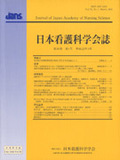Japanese
English
- 販売していません
- Abstract 文献概要
- 参考文献 Reference
- サイト内被引用 Cited by
要旨
目的:高齢者ケアにおける日常倫理に基づく援助技術を明らかにする.
方法:老人看護を専門とする5名の看護師の,日常の看護実践の参加観察とインタビューにより収集したデータを,質的統合法(KJ法)を用いて質的に分析した.
結果:高齢者ケアにおける日常倫理に基づく援助技術は,高齢者ならびに高齢者ケアにおける信念と前提を基盤に,看護師の内省を中核として高齢者をとりまく全体からケアを導く技術である.その性質には,【人格ある人/当たり前の生活】【尊厳ある最後の時に関わる】【高齢者の能力は見方次第】【高齢者一人ひとりの個別性の理解と尊重】【ケアする側される側のもちつもたれつの充足関係】【状況における最善のケア】が取り出された.
結論:本研究結果は,高齢者の日常ケアにおける看護の専門性を明示し,専門技術としての習熟と洗練に向けて活用することができる.
Abstract
Aim:The purpose of this study was to clarify the nursing care provided for elderly people based on everyday ethics in hospitals and nursing homes.
Method:Participant observations and interview data were collected from 5 Certified Nursing Specialists in gerontological nursing who worked on hospital or long-term care wards. All data were analyzed using the Qualitative Synthesis Method (KJ method).
Results:Nursing care based on everyday ethics was extracted from all data regarding elderly people.The core component was the nurse's reflection,which is based on the principles of elderly care. The following 6 characteristics were also extracted:[considering the elderly person as an individual with a unique character and way of living],[relating with dignity during the last stage of the elderly person's life],[the ability of the elderly person depends on the nurse's perspective],[individuality should be understood and respected],[fulfillment of the caring relationship is interdependent],and[providing the best care for each situation].
Conclusion:The present results indicate that specialized nursing care is required in everyday nursing practice. It is possible to use to be skilled and to refine nurses' professional skills.
Copyright © 2010, Japan Academy of Nursing Science. All rights reserved.


